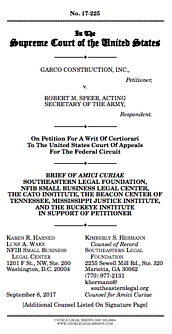In litigation seven years later, officials on the base justified their actions by testifying that they interpreted the regulation permitting checks for outstanding “wants and warrants” to include full background checks as well. Even though the Federal Circuit agreed that “wants and warrants” plainly referred only to a check for outstanding “wants and warrants,” it found the regulation to be ambiguous. Following Seminole Rock and Auer, which requires the court to defer to the government’s interpretation of an ambiguous regulation, the court deferred to a reading of “wants and warrants” that permitted the full background checks which led to the government’s turning away of contractors with minor criminal records. In conjunction with the Supreme Court clinic at Antonin Scalia Law School at George Mason University, Garco appealed to the Supreme Court seeking to overturn the Seminole Rock/Auerdoctrine.
Cato has joined the Southeastern Legal Foundation, the National Federation of Independent Business Small Business Legal Center, the Beacon Center, and the Mississippi Justice Institute in a brief in support of Garco. We argue that Seminole Rock/Auer allows executive agencies to side-step separation of powers and federal law by acting in judicial and legislative capacities not granted to them by the Constitution.
Seminole Rock/Auer deference allows federal agencies to quietly make new law inconsistent with the Administrative Procedures Act (APA). The APA’s chief safeguard against administrative overreach is requiring agencies to provide a “notice of proposed rulemaking” and “give interested persons an opportunity to participate in the rule making through submission of written data, views, or arguments.” Congress saw the notice-and-comment requirement as essential to holding agency heads accountable to both Congress and the public. Seminole Rock/Auer deference effectively exempts agencies from the APA’s notice-and-comment requirements.
Because agencies know that Seminole Rock/Auer requires courts to defer to their own interpretations of ambiguous language, the doctrine breeds a perverse incentive to promulgate vague rules which the agency can expand by interpretation. As the late Justice Scalia once observed: “the power to prescribe is augmented by the power to interpret; and the incentive is to speak vaguely and broadly, so as to retain a flexibility that will enable clarification with retroactive effect.” That is just what the army has done here: acted beyond the scope of their rule and harmed a private contractor, just to make it all disappear seven years later in a hindsight-driven interpretation.
In forcing courts to defer to backward-looking interpretations, Seminole Rock/Auer effectively gives administrative agencies the authority to re-write law through interpretation, without any accountability or notice to the public. “It is emphatically the province of the judiciary to say what the law is,” and it is for these reasons the Supreme Court should rein in Seminole Rock/Auer to take those powers back from the administrative agencies and put them back in line with the Constitution.

